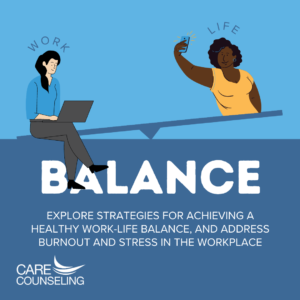Striking the Balance: The Psychology of Work-Life Harmony
 In today’s fast-paced and demanding world, achieving a healthy work-life balance has become increasingly challenging. Balancing professional responsibilities and personal well-being is crucial for our mental, emotional, and physical health. In this blog post, we will delve into the psychology behind work-life balance, explore the hurdles faced in maintaining it, and discuss strategies to achieve harmony. We will also address the detrimental effects of burnout and stress in the workplace, emphasizing the significance of prioritizing self-care in our journey toward a fulfilling and balanced life.
In today’s fast-paced and demanding world, achieving a healthy work-life balance has become increasingly challenging. Balancing professional responsibilities and personal well-being is crucial for our mental, emotional, and physical health. In this blog post, we will delve into the psychology behind work-life balance, explore the hurdles faced in maintaining it, and discuss strategies to achieve harmony. We will also address the detrimental effects of burnout and stress in the workplace, emphasizing the significance of prioritizing self-care in our journey toward a fulfilling and balanced life.
The Challenges of Work-Life Balance:
Achieving a work-life balance can be challenging due to several factors. Increasing workloads, long hours, and the pervasive influence of technology blur the boundaries between work and personal life. The pressure to excel in both spheres can lead to heightened stress, exhaustion, and neglect of one’s personal well-being. Additionally, societal expectations, fear of job loss, and the drive for success can exacerbate the struggle to maintain a healthy balance. Understanding these challenges is the first step toward finding effective solutions.
Strategies for Achieving Work-Life Balance:
- Setting Priorities: Clarify your values and identify your most important goals in both your personal and professional life. By aligning your activities with your priorities, you can allocate time and energy more effectively.
- Establishing Boundaries: Create clear boundaries between work and personal life. Set specific working hours, limit the use of electronic devices during personal time, and communicate your boundaries to colleagues and loved ones.
- Time Management: Develop effective time management strategies, such as prioritizing tasks, delegating when possible, and breaking larger goals into smaller, manageable steps. Efficient time management helps maximize productivity and allows for more dedicated personal time.
- Self-Care: Prioritize self-care activities that nurture your physical, mental, and emotional well-being. Engage in activities you enjoy, practice relaxation techniques, maintain a healthy lifestyle, and ensure you get adequate rest and sleep.
- Seek Support: Reach out for support from loved ones, colleagues, or professionals. Delegate tasks when possible, communicate your needs, and don’t hesitate to ask for help when feeling overwhelmed.
Addressing Burnout and Workplace Stress:
Burnout and workplace stress can have detrimental effects on our overall well-being. It is crucial to recognize the signs of burnout, such as chronic fatigue, decreased productivity, and emotional exhaustion. To combat burnout and stress, consider the following strategies:
- Stress Management Techniques: Practice stress management techniques such as mindfulness, deep breathing exercises, and physical activity to reduce stress levels and promote relaxation.
- Workload Assessment and Boundaries: Assess your workload and identify areas where adjustments can be made. Learn to say no to excessive demands and set realistic expectations for yourself.
- Work Culture and Support: Advocate for a positive work culture that promotes work-life balance and encourages open communication about stress and burnout. Seek support from supervisors, colleagues, or employee assistance programs when needed.
- Taking Breaks: Prioritize breaks throughout the workday, including short breaks to relax, stretch, or engage in enjoyable activities. Utilize vacation time to disconnect and recharge.
Striving for work-life balance is a continuous process that requires self-awareness, self-care, and the ability to establish boundaries. By recognizing the challenges and implementing strategies to achieve harmony, we can improve our overall well-being, relationships, and job satisfaction. Remember, prioritizing self-care and creating a healthy work-life balance not only benefits us individually but also enhances our productivity and effectiveness in both our personal and professional lives. Let us prioritize our well-being and cultivate a harmonious and fulfilling life.



























